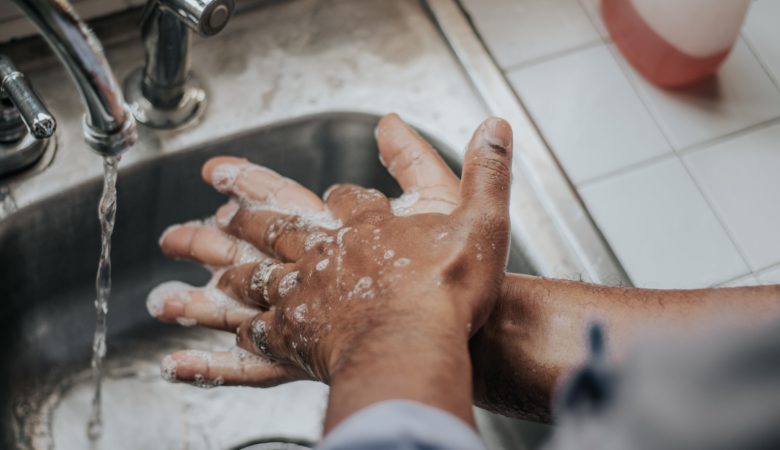The Hygiene Hypothesis: Is There Such a Thing as Being Too Clean?

Good cleanliness is extremely important. It helps prevent the spread of germs and benefits overall health. But is it possible to be too clean?
Some people believe washing yourself too much could lead to lowered immunity, making your body susceptible to a wide range of illnesses. This makes many people second guess whether they should frequently sanitize their hands or routinely disinfect their counter tops. As you might imagine, it can lead to a little bit of cognitive dissonance in the age of COVID-19, when CDC guidelines constantly tell us to sanitize everything!
Due to the pandemic, many people now take extra steps to improve the cleanliness of their homes and bodies. But could this be doing more harm than good? Below, we cover whether or not extreme cleaning is a good thing by looking at the Hygiene Hypothesis.
What is the Hygiene Hypothesis?
We’ve all heard of the Hygiene Hypothesis at some point. This idea claims people develop strong immune systems through exposure to infections and germs during childhood. It’s why many parents encourage their kids to play outside, and get a little dirty! The belief is that exposing children to germs early can build their immunity and keep them from developing common illnesses like asthma and allergies.
There is some weight behind this hypothesis, as children living in countries with higher exposure rates to certain bacteria seem to have lower rates of illnesses like asthma. However, there isn’t much scientific evidence supporting this theory. In fact, there’s plenty of evidence showing the opposite.
The importance of regularly washing your hands
Time and again, studies find washing your hands on a regular basis can help prevent many illnesses. For example, a study published in the American Journal of Public Health focused on hand-hygiene trials (1960 through 2007), to show how hand washing can help prevent gastrointestinal and respiratory illnesses.
“Improvements in hand hygiene resulted in reductions in gastrointestinal illness of 31% (95% confidence intervals [CI]=19%, 42%) and reductions in respiratory illness of 21% (95% CI=5%, 34%).”
During the study, researchers also found little difference in the benefits of using antibacterial soap compared to non-antibacterial soap. The important thing to take away from this study is that frequent hand-washing probably won’t lower your body’s immunity—and will in fact likely help prevent certain illnesses.
Proper hand-washing techniques
How long do I need to wash my hands? How much soap should I use? What kind of soap should I use? Using a proper hand-washing technique can make all the difference when it comes to eliminating germs.
The Centers for Disease Control and Prevention (CDC) shared an easy-to-follow method for washing hands:
- First, thoroughly wet your hands with running water and turn off the tap before applying soap. This helps save water and avoid possible contaminations associated with standing water.
- Next, lather every part of your hands with soap, including between your fingers and the backs of your hands. As mentioned above, there’s little benefit to using antibacterial soap over non-antibacterial soap, so use whatever good soap you have nearby.
- Scrub your hands for around 20 seconds to remove all dirt, grease and microbes. Rinse your hands with running water, then dry them with a clean towel.
Properly drying your hands is also important since germs have an easier time transferring to wet hands.
How often should you wash your hands
Everyone knows you should wash your hands after using the bathroom or before eating. But are there other times during the day people should wash their hands? Truthfully, it’s different for everyone.
The frequency at which you should wash your hands could depend on your line of work or the amount of cooking you do at home. For example, those who work with children or animals will likely need to wash their hands more often than someone sitting at a desk for most the day. Those working in the medical field or with food also need perfectly sanitized hands throughout most of their work day.
There are times when everyone should wash their hands, including before treating a wound or eating. You should also wash your hands when preparing food, coughing, sneezing, blowing your nose or handling garbage. Consider keeping hand sanitizer on hand to use after you touch a doorknob or use a gas pump.
Use your best judgement. If you’re unsure of whether you should wash your hands or not, it’s usually best to wash them.
Improve your immunity with proper cleaning
As you can see, there’s nothing wrong with taking extra precautions to keep you and your space clean. Use proper cleaning and hand-washing techniques to help ensure the removal of bad bacteria and curb the spread of illness. When it comes to improving your immunity, it’s also important to get the right amount of sleep, water and exercise.
All this is to say that while rolling around in the dirt as a child might support the Hygiene Hypothesis, it’s still important to safeguard yourself against germs. Often, a simple hand-washing is all it takes to protect your immunity.

